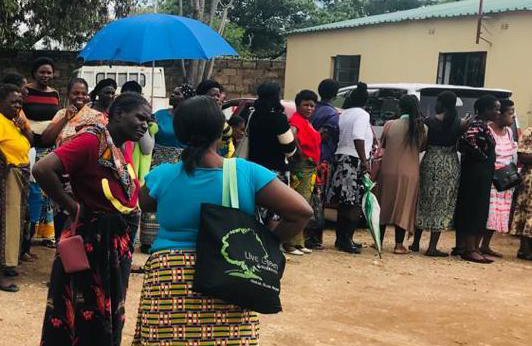Closing the gender gap worldwide could reduce hunger for 100 million people and yet Zambian women have unequal rights to land, a fundamental building block of food security and poverty reduction. Women face multiple challenges that limit their ability to realise secure land rights, including social, cultural, economic, and political factors. Inequality and uncertainty in accessing, controlling, and owning property for women deprives them of the opportunity to participate in national economic development, and negatively impacts our country as a whole.
Medici Land Governance in partnership with the Ministry of Lands and Natural Resources is implementing a Systematic Land Titling program that regularises parcels of state land in Zambia, including informal settlement areas. This program strengthens land administration systems and increases security of land tenure for land and property owners. As a result, land disputes and displacements will decrease, property-based revenue generation and investment will increase, and Zambia’s economy will grow stronger. Women must be included if these positive changes are to be realized. To this end, Medici Land Governance and the Ministry of Lands and Natural Resources have developed strategies and interventions to encourage women’s participation, and help women overcome the many challenges they face in securing their land rights.
In the Zambian society, women are often perceived as subordinate to men. Patriarchal systems promote male dominance over women in resource access, control, ownership, sexuality, reproduction and even women’s ability to use their own conscience and labour. As a result, women are treated as economic dependents to men, both socially and legally. Post-Independence, Zambia enacted the Intestate Succession Act to ensure that nuclear families are guided by codified laws on how property is to devolve were one dies without leaving a will behind and to reduce the violations against the rights of women to inherit thereby promoting equality. The Act regulates the devolution of a deceased person’s estate amongst the surviving spouse, children, dependents, and other relatives. These regulations play a key role in determining who should inherit from the deceased, the extent of what they should inherit, their rights and duties, and who should be disqualified from inheriting.
While the Intestate Succession Act provides women with some protection, there are ongoing impediments to their inheritance rights. Frequently, patriarchal customary principles are applied to ensure that male relatives inherit land and property to the exclusion of widows. These customary principles do not conform to the gender equality advancements promoted by the Constitution and other international and regional instruments. Therefore, the Intestate Succession Act’s historical development has received a lot of criticism over the years which has led to its amendment. However, regardless of the Intestate Succession Act having been amended to protect the rights of women, there are still a lot of long-standing challenges as regards women’s rights to inherit from their deceased spouses.
Sharon Kasoma Ng’uni a Senior Legal Officer at the office of the Administrator General has noted that:
‘’Despite the law providing in section 9 (1) (b) that a surviving spouse shall have a life interest which shall determine upon that spouse's death; in practice, this provision applies predominately to women alone because of society’s perception that property should be registered in a man’s name. This ultimately becomes a hindrance to women accessing and owning landed property.''
Women in polygamous marriages are provided weaker protections under the Intestate Succession Act. Section 10 identifies a surviving wife as an extra person to obtain a child’s share, as opposed to inheriting a share in her own right. This provision is blind to the contributions a widow would have made in the marriage, especially if she had no children or has fewer children than the other wives. Considering this provision, surviving wives to a polygamous marriage that have more children benefit more than those without or with fewer children.
The appointment of administrators can also disadvantage women. The Intestate Succession Act provides for the appointment of administrators to a deceased persons estate and specifies that the role of an administrator is to distribute the estate in accordance with the law. However, experience has shown that many administrators consider themselves beneficiaries of the estate and grab or misuse the property, thereby disadvantaging the surviving women and children. Local Courts are used frequently and a large numbers of administrators are appointed by these courts. Local Courts are founded on the administration of customary law prevailing within a locality and, as a result, the justices may overlook the appointment of the deceased surviving wife as an administrator.
The Zambian government has made great efforts to recognize and promote women’s land rights, including through the establishment of the National Gender Policy and the Gender Equity and Equality Act. The government has also issued a directive to the Ministry of Lands and Natural Resources and the Local Authorities that 50% of land allocations must be to women. Unfortunately, enforcement remains a challenge, particularly regarding inheritance rights. There is need to review and revise the Intestate Succession Act and to set in law the percentages that women should inherit in polygamous marriages. Non-progressive legal provisions such as the one reflected in the Intestate Succession Act, in which a widow loses a matrimonial house if she remarries, should be repealed. Harsher punishments should also be imposed on those who interfere with the deceased’s estate to the disadvantage of women and children, to deter would-be offenders. Local Courts should strive to promote women’s equality and empowerment in the appointment of administrators by not referring to customs that are patriarchal in nature. To this end, robust land governance interventions that mainstream gender ought to be considered in the promotion of women’s access, control, and ownership of land, to ensure that Zambian women have the opportunity to build their futures and pathways out of poverty.


